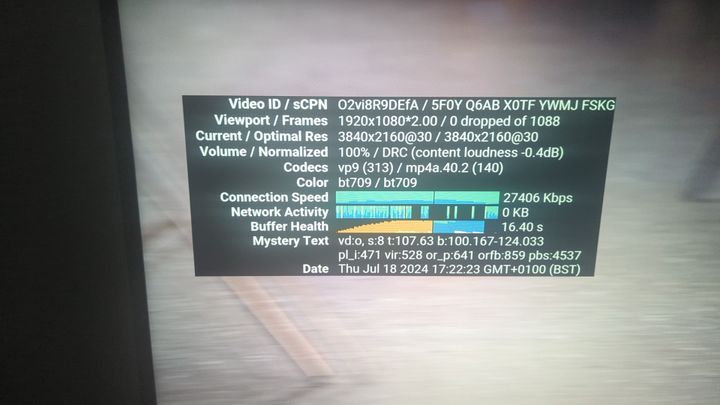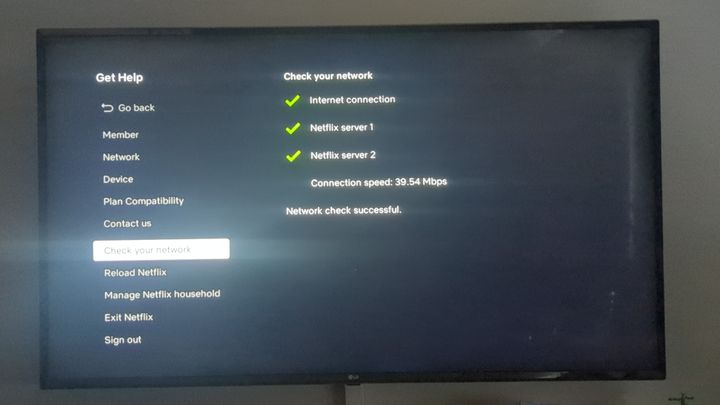Internet Connection speed at TV
Discussion
We had full fibre internet installed today and in general speeds around the house have improved a lot. Even on WiFi the upstairs office (furthest away from the router) is getting over 200mbps.
I was curious to see what the WiFi speed was at my TV and found a handy guide that allows you to do it via Netflix and YouTube.
I was relatively shocked to find that the connection speeds were between 30-50mbps. My phone (in the same location with 5g turned off) picks up over 500mbps.
Is this because the streaming services throttle it? Are high speeds simply not required?


I was curious to see what the WiFi speed was at my TV and found a handy guide that allows you to do it via Netflix and YouTube.
I was relatively shocked to find that the connection speeds were between 30-50mbps. My phone (in the same location with 5g turned off) picks up over 500mbps.
Is this because the streaming services throttle it? Are high speeds simply not required?
Can you get an ethernet cable to your TV? I’d be surprised if your TV lacks an ethernet socket.
Wired ethernet is always better than wifi, for a device like a large TV that never moves. It’ll always be faster, more reliable, unaffected by signal strength, and doesn’t take up any of your wifi bandwidth.
My rule is: if it never moves, always run an ethernet cable to it unless it’s logistically impossible. Save your wifi for the devices that really need it.
Wired ethernet is always better than wifi, for a device like a large TV that never moves. It’ll always be faster, more reliable, unaffected by signal strength, and doesn’t take up any of your wifi bandwidth.
My rule is: if it never moves, always run an ethernet cable to it unless it’s logistically impossible. Save your wifi for the devices that really need it.
Dr Mike Oxgreen said:
My rule is: if it never moves, always run an ethernet cable to it unless it’s logistically impossible. Save your wifi for the devices that really need it.
These days, 802.11ax has so much bandwidth it’s largely irrelevant. Of course, if your devices are “legacy”, then performance and efficiency are significantly reduced.
Mr E said:
These days, 802.11ax has so much bandwidth it’s largely irrelevant.
Of course, if your devices are “legacy”, then performance and efficiency are significantly reduced.
It’s quite likely that the OP’s TV doesn’t have the latest wifi standard, and we don’t know what his router and/or access points can do.Of course, if your devices are “legacy”, then performance and efficiency are significantly reduced.
And bandwidth isn’t the only factor. A TV tucked in the corner of a room, with brick walls on two sides, might be getting a poor wifi signal. Add in interference from whatever other devices are tucked into that corner, and…
For immovable devices, ethernet every time. WiFi is for mobile devices.
Edited by Dr Mike Oxgreen on Thursday 18th July 18:21
Mr E said:
The only thing that’s wired in my house is my desktop.
Everything else is 802.11ac.
Performance is completely fine (indeed, in most cases excessive)
It’s great that it works in your house, but we don’t know the construction of the OP’s house. Does it have thick stone walls, or stud walls with foil-lined insulation? Either would kill his wifi performance in certain locations.Everything else is 802.11ac.
Performance is completely fine (indeed, in most cases excessive)
Wired ethernet removes all those questions - it just works.
All of that said, 39 Mbps is certainly enough for HD streaming. And possibly enough for 4K as well. For those reasons, s/he might not get more than 100 Mbps even with ethernet, because the TV’s port might not be a gigabit port (it doesn’t really need to be).
It is possible that your TV may have a USB2.0 socket compatible with certain USB ethernet adapters. Ignoring the fact that the adapter below states USB3.0 & it is compatible with your TV, in reality you could get speeds up to around 200Mbps, assuming compatibility.
In theory maximum data speed of USB2.0 specification is 480Mbps.
https://www.amazon.co.uk/Cable-Matters-SuperSpeed-...
With my LG OLED I get speeds around 220Mbps using the above adapter, but choose to stick with WiFi for now.
No mass market TVs have gigabit ethernet, just 10/100Mbps. Only device I know of with gigabit ethernet is Apple TV 4K.
In theory maximum data speed of USB2.0 specification is 480Mbps.
https://www.amazon.co.uk/Cable-Matters-SuperSpeed-...
With my LG OLED I get speeds around 220Mbps using the above adapter, but choose to stick with WiFi for now.
No mass market TVs have gigabit ethernet, just 10/100Mbps. Only device I know of with gigabit ethernet is Apple TV 4K.
My house isn't particularly big. It's a standard 3 bed, late 80s, brick built, detached, mass built, estate home.
The TV is probably 8m from the router through one wall.
Router is a Vodafone PowerHub placed pretty much in the middle of the house
TV is a 55" LG 55UJ635V smart TV mounted to the wall.
With my last set up I had a Tenda MW6 mesh system which worked really well. I've tried hooking that up instead of the router but for whatever reason (haven't looked into it yet) it's not connecting or getting any internet.
Any tips on getting that to work would be greatfully received.
The TV is probably 8m from the router through one wall.
Router is a Vodafone PowerHub placed pretty much in the middle of the house
TV is a 55" LG 55UJ635V smart TV mounted to the wall.
With my last set up I had a Tenda MW6 mesh system which worked really well. I've tried hooking that up instead of the router but for whatever reason (haven't looked into it yet) it's not connecting or getting any internet.
Any tips on getting that to work would be greatfully received.
Are there actually any issues with the TV streaming?
Netflix requires 15Mbps for 4K streaming, so you should have plenty.
I agree that wired connection will be better than WiFi, so run a wire to it if you are having issues or really want to see a number closer to 100. If not forget about it and carry on with your day.
Netflix requires 15Mbps for 4K streaming, so you should have plenty.
I agree that wired connection will be better than WiFi, so run a wire to it if you are having issues or really want to see a number closer to 100. If not forget about it and carry on with your day.
wheelerc said:
Are there actually any issues with the TV streaming?
Netflix requires 15Mbps for 4K streaming, so you should have plenty.
I agree that wired connection will be better than WiFi, so run a wire to it if you are having issues or really want to see a number closer to 100. If not forget about it and carry on with your day.
You're right. I have experienced no actual issues... Yet Netflix requires 15Mbps for 4K streaming, so you should have plenty.
I agree that wired connection will be better than WiFi, so run a wire to it if you are having issues or really want to see a number closer to 100. If not forget about it and carry on with your day.
Its s t networking gear in the TV. Networking cards like anything else have specifications. TV has an old standard el cheapo card in it.
t networking gear in the TV. Networking cards like anything else have specifications. TV has an old standard el cheapo card in it.
I see speed differentials in the same spot between phone, ipad, laptops etc… all perform according to the quality of network equipment inside. Unsurprisingly, my Macbook Pro, with the best network card (comparatively) is always the top performer.
I’d bet good money the OPs LG tv is either old, from their budget range or both.
 t networking gear in the TV. Networking cards like anything else have specifications. TV has an old standard el cheapo card in it.
t networking gear in the TV. Networking cards like anything else have specifications. TV has an old standard el cheapo card in it. I see speed differentials in the same spot between phone, ipad, laptops etc… all perform according to the quality of network equipment inside. Unsurprisingly, my Macbook Pro, with the best network card (comparatively) is always the top performer.
I’d bet good money the OPs LG tv is either old, from their budget range or both.
Edited by wyson on Friday 19th July 12:07
It'll be your TV. Mine has ethernet and wifi and annoyingly runs worse via ethernet than the wifi, I assume TCL put the crappiest cheapest NIC in it, then by luck of every low end cheap cr@ppy wifi choip being quite good nowadays they chose the right one
Even then though, my tv still maxes out my 150mb fibre with a speed test, but streaming 4k files from my local plex server causes it problems as the bandwidth isn't high enough (gigabit networking but the tv can't take it), and youtube 4k sometimes takes a second or two to buffer which freezes the TV as it goes
Even then though, my tv still maxes out my 150mb fibre with a speed test, but streaming 4k files from my local plex server causes it problems as the bandwidth isn't high enough (gigabit networking but the tv can't take it), and youtube 4k sometimes takes a second or two to buffer which freezes the TV as it goes
Gassing Station | Computers, Gadgets & Stuff | Top of Page | What's New | My Stuff



